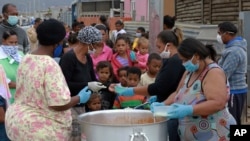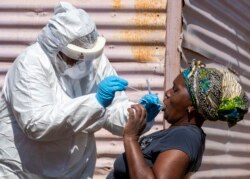South African President Cyril Ramaphosa is attempting to heal his nation's ailing economy after about a month of what amounts to a total business shutdown aimed at halting the spread of the coronavirus.
Late Tuesday, he announced a series of measures intended to both jump-start business and help the nation's poor as part of a stimulus plan worth $26 billion, or about 10 percent of the nation's GDP.
"The scale of this emergency relief program is historic," he said. "It demonstrates that we will not spare any effort, or any expense, in our determination to support our people and protect them from harm. We will — and we must — do whatever it takes to recover from this human, social and economic crisis."
It's difficult to quantify how this lockdown has impacted the economy. Ramaphosa, a careful speaker who won votes for his strong background in big business, said only that it was "devastating."
The nation's statistical agency recently reported that it could not count the economic losses sustained since the beginning of the lockdown, which started March 27, because its data collection has been stalled. Many of its publications — GDP figures, consumer price indices, and statistics of liquidations and insolvencies — have been delayed.
Ramaphosa did not say when the nation would return to full economic activity, but said the approach would be done in phases.
South African economist Mike Schussler has welcomed Ramaphosa's measures, but questions how they'll be funded, and whether they are enough to stanch the gushing wounds in the economy.
"I think this economic stimulus was really needed," he said. "We are in the doldrums and we do need to now get money to get this going again. However, what I do feel is I would have liked to have seen a little bit more on the announcements of the structural adjustments that we're going to be needing to make and when and how we're going to reopen the economy. … I think the measures are very close to being enough. I'm not too sure if we can afford them."
Ramaphosa didn't outline those details, but Schussler says there are two obvious solutions: Either raise taxes or cut government salaries.
"I admire the calmness of his demeanor in this crisis, but I am afraid that the hard work comes later," Schussler said. "It's very clear that some of these things will have to be financed. And it's easy promising the money. When you tell people later in the budget who's going to pay for it, I think a lot more people will feel it won't feel as positive as they do now, especially those that end up paying for all of this."
The COVID-19 crisis had infected 3,635 South Africans and had led to 65 deaths as of late Wednesday, according to figures from Johns Hopkins University in the U.S. Ramaphosa's plan, he has said, is part of an effort to create a new economy in one of the most unequal societies in the world, ravaged by unemployment and historical inequalities passed down from centuries of racist policies.
"Our new economy must be founded on fairness, empowerment, justice and equality," Ramaphosa said. "It must use every resource, every capability and every innovation we have in the service of the people of this country. Our new economy must open up new horizons and offer new opportunities to all South Africans."






